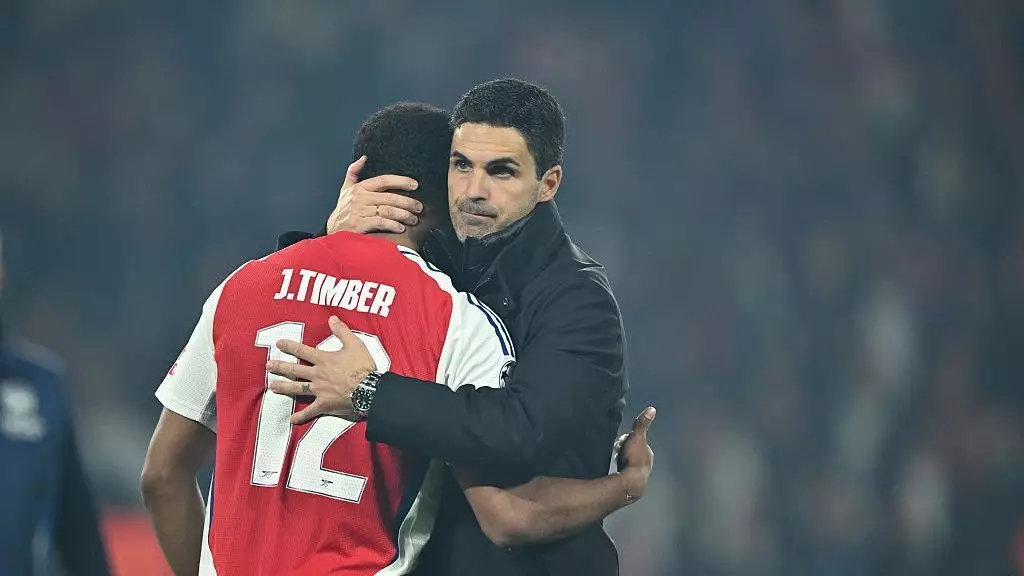In a spectacle that saw Arsenal fight valiantly yet ultimately succumb to Paris Saint-Germain in the Champions League semifinals, emotions ran high as the Gunners experienced yet another crushing near-miss. Mikel Arteta’s assertion that “the best team lost” echoed the sentiments of many who witnessed the match. Arsenal showcased resilience and determination with explosive energy in the opening minutes, creating palpable pressure on PSG. However, a combination of stellar goalkeeping by Gianluigi Donnarumma and critical missed chances ultimately sealed Arsenal’s fate in a 2-1 defeat that compounded their frustration of failing to win any trophies for the fifth season running.
The match began in dramatic fashion, with Arsenal demonstrating their attacking prowess. Gabriel Martinelli and Martin Ødegaard tested Donnarumma within ten minutes, but the PSG goalkeeper’s quick reflexes denied what could have been a game-changing early goal for the Gunners. This moment could be looked at as a pivotal turning point. If Arsenal had found the net, the dynamics of the match might have shifted dramatically, leaving PSG more vulnerable and on the back foot. Such analysis highlights the significance of capitalizing on early opportunities in high-stakes matches, a lesson the young Arsenal side will undoubtedly take to heart.
A Clash of Perspectives
After the match, Arteta, despite his disappointment, found solace in the tenacity displayed by his players. Their tears reflected not just despair but a passionate commitment to their shared goal. Contrastingly, Luis Enrique, head coach of PSG, offered a different narrative, emphasizing the importance of scoring goals over playing well. “We deserve to get to the final,” he countered, suggesting that regardless of the performance nuances, PSG executed their strategy more effectively by finding the back of the net. Such differing opinions illuminate a fascinating aspect of football—the blend between artistry in play and the stark realism of results.
Arteta’s bold claim about the match not aligning with the outcome might resonate with many in the football community who believe that quality of play should sometimes outweigh results. It raises an age-old philosophical debate in soccer regarding whether a team that plays beautifully without the results can be deemed superior.
Lessons in Setbacks and Growth
Declan Rice, a key player for Arsenal, also threw light on the fine margins that dictate matches of this magnitude. His insights that “if you score one of those chances…the game completely changes” encapsulate the razor-thin line between success and failure. The pressure cooker environment of the Champions League only intensifies these pressures, transforming player psychology and shaping their development. It’s crucial now for Arsenal to leverage these highs and lows effectively. Rice’s optimism that they’re growing stronger through these setbacks speaks volumes about the character of this young squad.
Furthermore, the statistical gravity of this loss is noteworthy. This marks a streak of four consecutive failures to progress past the semifinal stages in major cup competitions—an unnerving statistic for any club with aspirations of grandeur. However, rather than allowing this record to engender complacency, it can serve as a catalyst for transformation. Just as Rice articulated, the process of overcoming adversity is tangible; losing can forge greater resilience, as players and the team evolve both mentally and tactically.
The Road Ahead: A Culture of Winning
As Arsenal air their wounds from this agonizing defeat, one can sense a distinct future formation brewing. The trajectory they’re on, while currently disheartening, hints at foundational strengths that could serve as the bedrock for future triumphs. Arteta’s leadership—a blend of emotional intelligence and tactical acumen—will be pivotal in knitting together the lessons from this exit into a more robust Arsenal identity.
The club is at a crossroads that will require strategic reflection and adaptability. For Arsenal to break the cycle of near-misses, they must cultivate a culture founded on unyielding ambition, tactical maturity, and self-belief. This aligns with the idea that it is not just about the game today; it’s about building a legacy that transcends the immediate results, echoing Rice’s sentiment that enduring loss may very well be a rite of passage towards eventual glory.
Arsenal may not have longed for this moment of heartbreak, but in the context of sport, these moments often lay the groundwork for significant growth and eventual success. The spirit of the Gunners should not be diminished; instead, it can be crystalized into a more formidable force for the future.


Leave a Reply